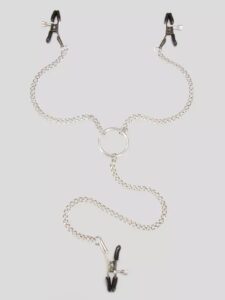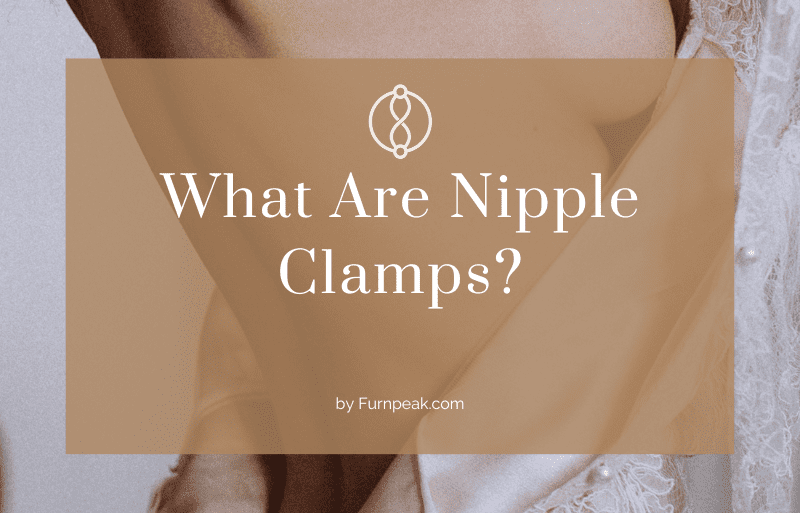What Are Nipple Clamps?
So, you’ve stumbled across the term “nipple clamps” in a hushed conversation or perhaps an article, and now your curiosity is piqued.
These peculiar items might conjure images of dark, musty BDSM chambers and wince-inducing pain. However, let me assure you, there’s much more to nipple clamps than meets the eye.
Designed to be adaptable, accessible, and even aesthetically pleasing, nipple clamps offer a whole spectrum of experiences! Intrigued? Let’s start!
What Are Nipple Clamps?
Well, in the simplest terms, nipple clamps are small devices resembling clips or tweezers.
They are made to fit snugly around the nipples or any petite areas of the skin. These mini toys come in a myriad of designs and materials for a variety of sensations.
Who can use nipple clamps, you ask? The answer is also pretty simple: anyone who wishes to!
Irrespective of your gender, body type, breast size, or nipple sensitivity, there’s a nipple clamp out there with your name on it!
If you’re someone who relishes a little nip play, like gentle biting or tugging, nipple clamps might just be your new best friend.
They’re designed to imitate and even intensify these sensations!

How do they work?
Beyond their sultry aesthetic appeal, nipple clamps can lead to some truly magical sensations.
When worn snugly, nipple clamps restrict blood flow to your nipples, marrying the pinching sensation with a gradual numbing feeling. But do they hurt? That really depends on how you like to play. They can be adjusted to provide a range of sensations, from gentle pressure to a sharper pinch.
After enjoying the heightened sensations with the clamps on, brace yourself for the big wave of pleasure that comes with removing them! Once released, blood surges back into the nipples while your brain releases a flurry of oxytocin, also known as the “love hormone.” What follows is a whirl of warmth, tingling, and hypersensitivity.
Combine this sensation with climax build-up, or remove them at the peak, and you’ve got a recipe for some seriously explosive feeling!
The aftermath leaves your nipples extra perky and receptive to other types of stimulation. Go ahead, shower them with affection – be it a gentle caress, a teasing lick, or a delicate suck (yeah, your partner should read this).
Nipple clamps types
The experience with nipple clamps can be incredibly diverse. From mild pinching to firm clamping, also from light tugging to intense pressure – there’s a pair for every taste!
With so many types available, each offering unique sensations and catering to different experience levels, it’s important to find the right fit for you!
- Tweezer nipple clamps: perfect for beginners, they're highly adjustable, lightweight, and suitable for most nipple sizes.
- Magnetic nipple clamps: these provide an instant grip and a delightful pinch. They're also easy to apply and remove.
- Nipple clamps with chains: the chains not only add a touch of allure but also allow for playful tugging during your pleasure sessions.
- Weighted nipple clamps: if you're seeking an intense sensation of pressure and pulling, these are just the ticket!
- Vibrating nipple clamps: these are a must-try for those who crave a thrilling vibration coupled with the pinch.
Conclusion
In conclusion, nipple clamps can be a tantalizing addition to your pleasure arsenal. Start exploring and find the perfect match for your desires! Happy playing!
FAQ
Who can use nipple clamps?
Anyone can use nipple clamps, regardless of gender, body type, breast size, or nipple sensitivity. They are versatile tools that can offer a thrilling experience to both beginners and seasoned users.
What does it feel like to remove nipple clamps?
Removing nipple clamps typically results in a rush of heat, pain, and heightened sensitivity, as blood returns to the nipples and the brain releases oxytocin. This can often lead to a very intense orgasm.
How can I match my desires to the perfect nipple clamp?
There are many different types of nipple clamps to cater to various sensations and levels of experience.
Whether you prefer the adjustable nature of tweezer clamps, the simplicity of magnetic clamps, the aesthetic appeal of chain-attached clamps, the intensity of weighted clamps, or the vibrations of vibrating clamps, you can find the perfect match for your desires.
Do nipple clamps cause any long-term harm or discomfort?
When used properly and safely, nipple clamps should not cause any long-term harm or discomfort. It’s important to listen to your body and adjust the clamps to your comfort level. If you experience persistent pain or discomfort, it’s recommended to remove the clamps and consult with a healthcare professional.
You may also like
Table of Contents
Toggle












